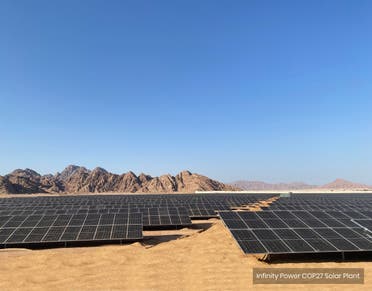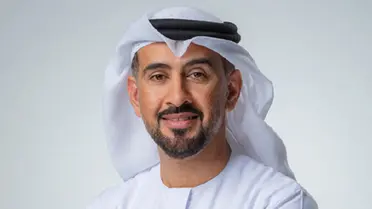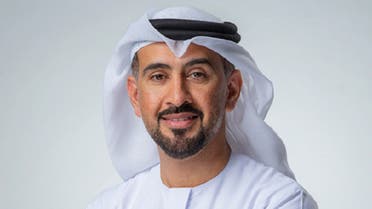Road to COP28
Exclusive: Energy storage solutions critical component of transition, says Masdar CEO
Storage solutions play a pivotal role in transitioning to renewable energy as they address the intermittency of naturally sourced energy, a senior official at the Abu Dhabi-backed Masdar told Al Arabiya English.
As the Gulf state hosts the UN climate conference COP28 for two weeks from November 30, state players like Masdar have a crucial role to play in local and regional net-zero emission goals.
“We recognize the significance of energy storage in enabling the grid’s seamless integration of renewable energy to provide stable, secure and affordable low-carbon power,” Chief Operating Officer at Masdar Abdulaziz Alobaidli said.
Masdar and regional energy companies like Saudi Arabia’s ACWA Power have invested heavily in energy storage solutions, which have been identified as essential components to balance the irregular nature of wind, solar and some hydro-powered clean energy options.
Masdar acquired battery energy storage system (BESS) developer Arlington Energy and has committed to invest a further $1.2 billion in energy storage projects across the UK, where 50 percent of energy generation is from renewable sources.
The firm has also introduced an energy storage solution called Batwind to store electricity generated from the world’s first commercial floating wind farm in Scotland. To further the technology, it has also established an R&D facility in collaboration with Khalifa University of Science and Technology and TÜV Rheinland to optimize the performance of energy storage solutions and their applicability in real-world conditions.
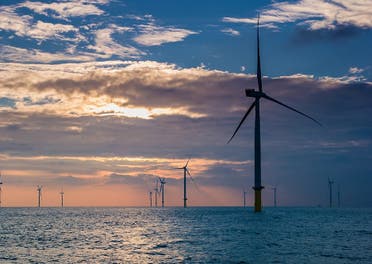
“By embracing renewable energy, we can reduce our dependence on finite fossil fuels and mitigate climate change while advancing social and economic development, particularly in emerging economies,” Alobaidli said.
“It is also important to make it clear that renewable energy is now, in most cases, cheaper than conventional generation sources of electricity. To those who remain hesitant, I encourage you to consider the possibilities, the progress we’ve made, and the vast potential for a sustainable, greener future. Renewable energy isn’t just an option, it’s a necessity,” he added.
The thought was reflected by ACWA Power CEO Marco Arcelli, who, when speaking to Al Arabiya English last week, said investing in renewable energy sources is no longer just a matter of ideology but “pure business sense.”
The Saudi-headquartered energy and desalination company is a leading MENA regional player in the state-backed transition to developing renewable energy sources. It operates 75 assets with an investment value of $79.4 billion (SAR 297.75 billion) across 12 countries, of which 46.6 percent are renewables.
Masdar operates in more than four countries with investments, or commitments to invest, to the tune of $30 billion and a 20 GW capacity. They hope to achieve a 100 GW combined power output by 2030. The CEO of oil and gas giant ADNOC and the President-designate of COP28, Sultan al-Jaber, also chairs Masdar.
The firm is planning to develop a green hydrogen production capacity of 1 million tonnes per annum by 2030, but a majority of its portfolio will continue to be photovoltaic solar and wind projects.
Masdar said it sees “significant potential” for the development of more wind energy across the GCC, including the UAE, where advanced technologies can provide significant and stable energy resources from lower wind speeds.
“While the Red Sea Coast in Egypt and Saudi Arabia was previously regarded as an optimum location for developing wind energy in the region, the development of new low-wind technologies will enable the development of wind energy in countries such as the UAE, Bahrain and Qatar,” the Masdar COO said.
Masdar currently operates the Middle East’s largest wind farm in Saudi Arabia.
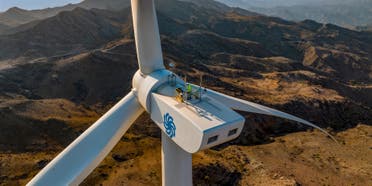
Partner and diversify
“Public-private partnerships are pivotal in advancing our national energy transition,” Alobaidli said, adding that collaboration and innovation will be “critical” to solving the issue of climate change.
Masdar collaborates and partners with governments, regulators, MNCs, energy firms, financial institutions and banks, locally and internationally.
Citing the example of the Saudi giga-project Amaala, developed to be a net-zero property by Red Sea Global, Masdar is working on renewable energy systems, desalination, and wastewater treatment.
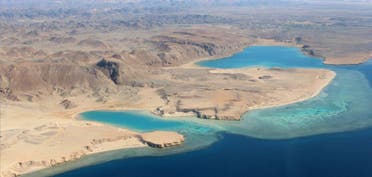
“This showcases the power of public-private cooperation in achieving sustainable objectives,” Alobaidli added.
ACWA Power chief Arcelli also highlighted the importance of public-private partnerships, saying: “The beauty is that you can mobilize much more resources than you immediately have. If you go to a country, you don’t really take a lot of their budget, which they can allocate to other programs, investments, and infrastructure.”
“They [the government] are getting repaid with a little bit of money over a long period of time. So that’s, I think, very efficient and effective for the governments,” he said, adding that the partnerships are “bankable,” allowing lenders to enter the picture.
In addition to partnering with stakeholders, diversification of energy sources is crucial, both executives said.
In any electricity network, a diverse portfolio of power generation is critical to ensuring energy security and reducing carbon emissions, said Alobaidli.
“The cost of developing utility-scale solar energy has fallen more than 80 percent over the past decade, and, even in the current tougher global economic climate, remains one of the cheapest forms of generating electricity,” he said, adding that the UAE and GCC have emerged as one of the most cost-competitive markets for developing unsubsidized solar energy in the world.
“The UAE is acutely aware of the severe impacts of climate change. We must all, especially developed countries, scale up investment in food, water, nature, and resilience in vulnerable communities. We believe climate action will unlock economic growth and opportunity for future generations, and we are showing it with our investments,” the Masdar executive added.
The UAE is one of the world’s largest investors in global renewable energy projects, having already committed $50 billion in projects in more than 70 countries, with another $50 billion of investments targeted by 2030. It hopes to generate 50 percent of its energy from clean sources by 2050.
“For energy transition to succeed, and the 1.5 degrees Celsius target set out in the Paris Agreement to be successfully achieved, it needs to be fully inclusive,” Alobaidli said.
